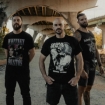Deathcore is no longer the new kid on the block, but a rich, multi-dimensional genre with sturdy institutional support, a loyal fanbase and over 15 years of history to its name. It feels like a century has passed since the days when you couldn't scroll five minutes without seeing someone complain about Job For a Cowboy's pig squeals or launch into a diatribe about how breakdowns signify a lack of musical talent. Now, deathcore is just part of the greater fabric of metal, and it's continued to evolve over the years as new bands have brought different influences and veteran bands have tried ambitious new directions.
A definitive ranking of the genre's greatest releases would be impossible to do in less than 50 inclusions, but we picked 15 albums that are among the very best and/or most significant from throughout deathcore's storied history.
The Acacia Strain - Wormwood
Before there was deathcore, there was the Acacia Strain. The band's 2000s catalog is full of prescient mosh material, but their 2010 album, Wormwood, is a genre standout that injected elements of sludge and doom into their low-and-slow style of churning deathcore.
All Shall Perish - The Price of Existence
Years before he would fill the gigantic shoes of Mitch Lucker as Suicide Silence's new frontman, Eddie Hermida cut his teeth in the now-defunct Oakland band All Shall Perish. The group's 2006 sophomore album, The Price of Existence, was an instant standout that boasted interesting grooves, uniquely melodic leads and songs about corporate control, fascism and environmentalism that were a breath of fresh air in a genre where lyrics often felt like an afterthought.
AngelMaker - Dissentient
AngelMaker's 2016 record, Dissentient, is a landmark album from deathcore's second wave. Not only are these Vancouver torchbree-ers fronted by two, equally talented vocalists, but they manage to sew a litany of melodic elements into their sound — clean guitar passages, hardcore gang-chants and genuinely gorgeous leads — without losing any ground in the ongoing war for breakdown supremacy.
As Blood Runs Black - Allegiance
As Blood Runs Black were relative outliers in the scene who made screechy deathcore that borrowed equally from the Gothenburg metalcore sound and their deathcore-adjacent peers in the Black Dahlia Murder. Although they were plagued by lineup changes, going through a whopping seven different vocalists in a nine-year time-span, the California band's 2006 debut, Allegiance, was a pinnacle of its era that added a fun flair to the genre's stone-cold demeanor.
Bring Me the Horizon - Count Your Blessings
Although they haven't made a deathcore song in well over a decade, it would be dishonest to talk about the history of the genre writ large without mentioning Bring Me the Horizon. The English band's 2006 debut, Count Your Blessings, is a relic of its era in so many ways — the haircuts, the production quality, the fact that BMTH sound the way they do — but there's no denying the MySpace popularity of a song like "Pray for Plagues," and the fact that it still goes hard as fuck.
Carnifex - Die Without Hope
Carnifex are deathcore lifers. Although they've never been the single biggest band in the genre, the San Diego bruisers have released excellent albums for the last 15 years with remarkable consistency. Different fans will tell you a different album of theirs is the one (which is the mark of a great discography), but Carnifex's 2014 record, Die Without Hope, is a terrific entry point for newcomers and an undeniable classic for longtime fans.
Chelsea Grin - Desolation of Eden
Chelsea Grin took obvious cues from Suicide Silence on their 2010 debut, with a particular affinity for aching chugs, shrieky highs and mic-cupping lows. The Salt Lake City band's sound has changed a lot since then, and they're currently down to just one original member, but Desolation of Eden was everywhere in the early 2010s and it remains an important part of the genre's lineage.
Despised Icon - The Healing Process
Like the Acacia Strain, Despised Icon were making deathcore long before people had a name for it. The Canadian band's 2002 debut, The Healing Process, is an absolutely pivotal, pioneering deathcore album that gave bands the go-ahead to draw equally from Hatebreed, Poison the Well and Suffocation. Despised Icon went on to release objectively better records later on in the decade, but The Healing Process is required listening for understanding the origins of every other group on this list.
Fit for an Autopsy - Absolute Hope Absolute Hell
The brainchild of revered producer-guitarist Will Putney added new frontman Joe Badolato for their 2015 album, Absolute Hope Absolute Hell, and it's easily one of the finest — and low-key most underrated — deathcore records of the 2010s. With a triple-guitar attack, super tight instrumentation and smart songwriting choices, Fit for an Autopsy add all sorts of textures and dynamics to the deathcore idiom without ever relying on wanking technicality.
Job for a Cowboy - Doom
It's not even a full-length album, but Job for a Cowboy's seminal 2005 EP, Doom, is arguably the most influential deathcore release of all time. Arriving about a year-and-a-half before the genre really took off, this seven-song project was an instant yet polarizing smash hit that set the bree-bree template for innumerable bands in the years that followed.
Make Them Suffer - Neverbloom
Winds of Plague tinkered with it a few years earlier, but Make Them Suffer fine-tuned the art of symphonic deathcore on their 2012 debut. Commonly praised as one of the genre's greatest achievements, Neverbloom featured haunting piano lines and chilling clean vocals from former member Louisa Burton that added waves of emotion to the Australian band's beastly sound. Who knew deathcore could be beautiful?
Shadow of Intent - Primordial
Bands like Rings of Saturn and the Faceless helped set the precedent for proggy, techy deathcore, but Shadow of Intent mastered it on their 2016 album, Primordial. The Connecticut group formed as a Halo-themed studio project, and this record brought the athletic guitar riffs and symphonic atmospheres of a tech-death band like Fleshgod Apocalypse into the deathcore setting.
Suicide Silence - The Cleansing
It really doesn't get much better than this. Suicide Silence's 2007 debut, The Cleansing, took a steel-toed stomp on every deathcore album that came before it, defining the genre's sound for the next half-decade and ushering it into the greater metal consciousness. The late Mitch Lucker's vocals on this record are not only painfully brutal, but memorable and strangely catchy in a way that few other artists have been able to replicate. RIP.
Thy Art Is Murder - Hate
As the genre became overtly saturated toward the end of its first wave, Thy Art Is Murder were one of the bands who showed that deathcore still had plenty of gas in the tank. Hate was the second album that the Australian crushers released with vocalist CJ McMahon, and it's simply a superior deathcore album with booming production, furious energy and vocals from McMahon that personified the three-headed monster on its cover art.
Whitechapel - This Is Exile
Given that their 2014 album, Our Endless War, peaked at No. 10 on the Billboard 200, Whitechapel are likely the most popular deathcore band of all time. After quickly becoming one of the genre's main players during its breakout years, they've continued to release inventive and monstrously heavy records to this day, but 2008's This Is Exile is, like Suicide Silence's The Cleansing, an unequivocally crucial part deathcore's developing years.












